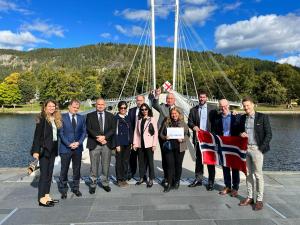
Public procurement represents 10 per cent of Georgia’s GDP. Therefore, innovation-enhancing procurement (IEP) can be a powerful policy lever to catalyze innovation and promote sustainability. Using public procurement to drive innovation is one of the recommendations arising from the Innovation for Sustainable Development Review (I4SDR) of Georgia, published by UNECE in 2021 with funding from the Swedish Government. By specifying a desired sustainability/innovation outcome on the public tenders (e.g. decrease emissions from heating this building by 40%) rather than any particular product/service (e.g. purchase 40 heaters for this building), IEP opens the way for companies to create innovative solutions for reaching that outcome. Benefits of IEP can thus include economies of scale, improvements in product quality and performance, incentives for development of new products, creation of new markets and expansion of existing ones, and alignment with the SDGs.
The Government of Georgia, conscious of the potential of IEP for accelerating progress towards its development objectives, has drawn on this recommendation and amended in 2022 its law on public procurement, introducing innovation partnerships as one of the elements of IEP. This step is particularly important in the context of Georgia’s Association Agreement with the European Union, as it contributes to harmonizing Georgia’s legislation with the EU Acquis Communautaire. The law is being presented to the Georgian parliament at the time of writing.
More comprehensive implementation of IEP requires technical expertise in designing public tenders, contracts and evaluation mechanisms. To that end, and to successfully drive the demand for innovation and enable its adoption and diffusion, the regulatory framework (including “soft-law” manuals and guidelines) needs to be developed, along with the capacities of the State Procurement Agency (SPA) and the Georgia Innovation and Technology Agency (GITA) to guide and implement these technical procurement procedures.
To accompany Georgia in this reform effort, a UNECE-devised capacity-building programme has developed a handbook on IEP in Georgia, which provides policy guidance in this area together with recommendations tailored for Georgia.
As a second step, on 14 to 16 September, UNECE conducted a study visit of officials from SPA and GITA to Norway to enhance their capacity to implement IEP.
The visit was hosted by the University of South-Eastern Norway in Drammen on 14 and 15 September. Georgian officials learnt about the experience of Norway in implementing IEP from representatives of the Norwegian Ministry of Local Government and Regional Development, the Norwegian Agency for Public and Financial Management, the National Programme for Supplier Development, the Norwegian Research Council and Oslo Economics. Following these two days of lively, interactive dialogue, the event concluded with a presentation of the StartOff programme at Oslo Science Park on 16 September. As this programme facilitates the participation of innovative start-ups in public procurement, this visit provided a private sector perspective on IEP and highlighted specific considerations for involving start-up companies in the process.
UNECE is grateful to all the above-mentioned Norwegian partners for their in-kind contributions to this activity, and to the Swedish Government for the funding that made it possible. The study visit provided Georgian officials with a strong understanding of the practical and technical aspects of IEP, and will inform their strategy for the ongoing policy reform. As a pragmatic next step, Georgian officials are discussing adapting the technical templates and procedures provided by the Norwegian presenters to develop a training programme for procurement officials in the country.